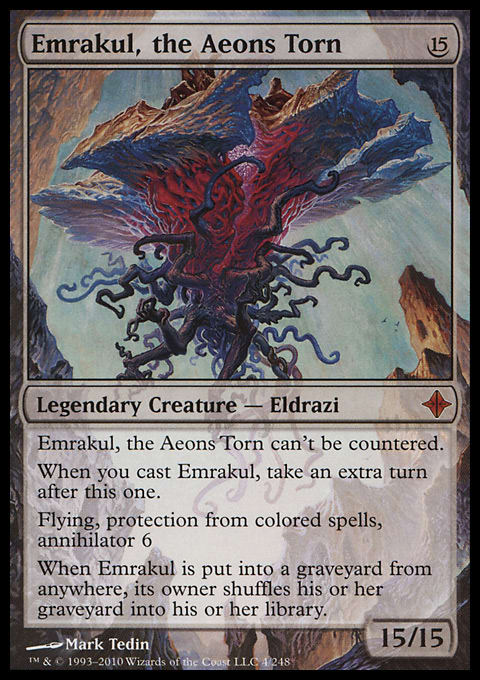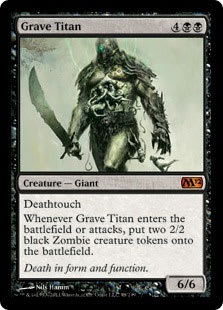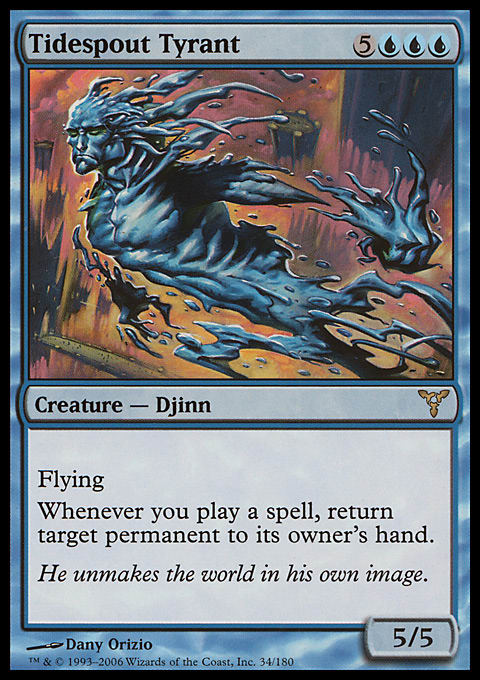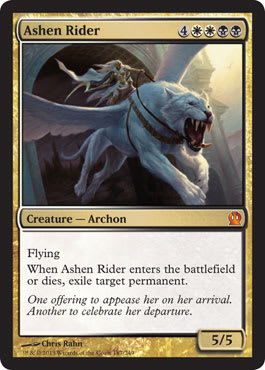Roman Emperor Marcus Aurelius had his own bad-beats story. Disasters struck his prosperous reign, from plagues to invasions of barbarians2 (those red creatures never let up). To stay sane and powerful, he adopted the Greek philosophy of stoicism.3 Stoics believe the one thing they can fully control in this chaotic world is their own emotions.

Marcus Aurelius kept a journal, his Meditations, as a way to focus on his feelings, to evaluate them, and to change his outlook. Stoics train their minds as they would any other part of their bodies, through discipline and practice.
Mental Training: Keep a Journal
Becoming aware of our thinking patterns will empower us to change them. We can write down negative emotions between Magic matches, after the tournament, or even during games (of Magic Online). For a tech method of recording our feelings, search the smartphone app store for "cognitive behavior therapy" or "CBT."
Stoicism isn't a philosophy used only by the ancients. It gave rise to modern cognitive therapy, and the army uses its maxims in the program Warrior Resilience and Thriving.4
Stoic warriors never allow themselves to be surprised by misfortune. They embrace it as part of the experiences. The philosopher Seneca cautioned his emperor pupils, "There is no easy way from the earth to the stars."6
As Magic players, we can build powerful decks. We can envision victory. To prepare, we can also meditate on defeat. We play a game of chance, and accepting the possibility of mulliganing down to oblivion allows us to prepare a mental response. We gain an edge by being stoic, whereas other players might tilt and lose their chances at winning the matches and tournaments. Contrary to the common use of the word, true stoics don't annihilate their emotions. Rather, in the face of bad luck, they smile.
Mental Training: Revel in Variance
If our victory were certain, Magic would be boring. A skillful chess player will always beat a newbie. In Magic, a master Planeswalker still must fear. Drawing a new hand always brings a jolt of excitement because it all could go so wrong. And if it does, winning against ill fate and cruel gods will be a triumph to savor for years.
We can't all be Roman emperors, but coming in first at a tournament gives us a thrilling taste of power. To win again, we tune our decks and practice all the matchups. We master the metagame. We drive, fly, and wake up early to reach the tournament on time. Then, we go 0-3 due to bad luck and unfortunate matchups.
We could very well become angry. Who could blame us? We'd put in all the hours. We deserved to win. Why should we shake the hand of our top-decking opponent? Just throw the match slip, and toss away the pen. This should've been our tournament. We'd done everything right.
No, a stoic would say. Our one mistake was to allow ourselves to become angry. The Roman philosopher Seneca wrote a letter to his brother, explaining why he was prone to tilting rage.
Anger arises when our expectations jar with reality.5 If we allow ourselves to be kings in our own mind, we'll only be satisfied with the best. We'll overestimate our ability to control the world. How dare these players not concede to royalty? Only we deserve good luck, and each top-deck must be served on gold plate.
Mental Training: Don't Think Yourself a King
Stoic Magic players understand the odds of winning (60%-70% per match with the best preparation) and, more to the point, the odds of losing. Even in a favorable matchup, losses can happen. No outcome will surprise or frustrate. As Seneca said, "It is either arrogance or ignorance that makes us prone to anger."6
Through reflection and study of my losses, I've found I'm at greatest danger of thinking myself a king after a perfect Draft--or if my Constructed matchup is highly favored. In such cases, I'm more prone to sloppy play. Then after I lose, the anger roars in.
I hope to combat this tendency by priming better ways of thinking. I'll tell myself there's always a chance to lose. My opponent may have prepared even better than I. And luck happens.
I'll take a deep breath after defeat. I'll remind myself what a privilege it is to play Magic, and I'll extend my hand to congratulate my opponent.
Mental Training: Challenge Unproductive Thoughts
All emotions are not equal in the mind of a stoic, and they come hand in hand with thoughts. Here are a few cognitive patterns to watch out for:7
- Privileged: "I deserved to win that game."
- Labeling: "I'm unlucky today."
- Extremist: "I'm the worst at this game." Or, "I'm unbeatable!"
- Spiraling: "I lost Game 1 against this Hall of Famer. What's the point of sideboarding? I could never win the match."
The idea that we lack complete control of our destiny may not sit well with gamers. Magic players pride themselves in making the right plays to earn the win. But if we'll admit it, that's not what always happens. In fact, sometimes it's the opposite.
In a recent tournament, I made a mistake. Being new to Legacy, I overestimated my ability to close out a game by reanimating Grave Titan on the draw. Turn one, I cleared the way for the gravy train with a Thoughtseize, but in doing so, I allowed my opponent to cast Show and Tell a few turns later for something a little bigger.
I had made a mistake. Worse, I'd built my deck without an Ashen Rider, and I couldn't Entomb and Exhume my way out of this predicament--two face-flushing missteps. Many would say I deserved to lose that game. Every moment I spent squirming over errors would drag me further from victory and closer to a slow-play warning.
. . . Except, I didn't mull over my mistakes. I spent my time constructing a new game plan. It was torturous, involving a chump block with Griselbrand, but a turn later, I had my Tidespout Tyrant on the battlefield along with another spell. The Djinn slapped the Eldrazi back to my opponent's hand.
I only won that game because I was able to forgive myself my errors and refocus. I used cognitive techniques to sidestep anger. In this case, I told myself that even Hall of Famers make mistakes.8 Magic players will need to find the cognitive weapons that work best for them. As a rule, though, I recommend postponing critical analysis until after the match (or tournament), and our good friend Marcus agrees.
Mental Training: Stay focused
After the tournament, I swapped out Tidespout Tyrant for Ashen Rider. This decision should unsettle seasoned Planeswalkers. Tilting makes us vulnerable to results-oriented thinking. It would be all too easy to swear off the big blue Djinn for all the wrong reasons in a fit of gamer froth.
Results-oriented thinking means ignoring the playing process and setting our sights on the outcome. By gazing too far ahead to winning the tournament (or behind because of a loss), we may stumble over misplays. Studies have shown people are less likely to work hard when they fixate on their goals.10 (The Secret can bite it.) If we spend too long basking in our soon-to-be-glory, we're falling victim to thinking of ourselves as kings. Instead, focus on each play required to gain the crown.
In the question of the Djinn and the Archon, I believe Ashen Rider to be the better choice after studying the metagame. I want to give more weight to the process of playing the format than any emotion like anger or joy. After all, Tidespout Tyrant did end up winning me the game. I'm still moving him to the retirement home of bomb fatties: Commander.
Changing my deck is something I can control. The matchups I face during the tournament are less so. Stoics should concern themselves only with the former. Agonizing over misfortune serves nothing.
After starting 4-0 at a Pro Tour Qualifier, I lost three of my remaining five matches. I reviewed the tournament and decided my play may have worsened due to fatigue caused by low blood sugar. I can't control the top of my opponents' decks, but I can make certain to play at my peak skill by maintaining good nutrition, rest, and fitness.11 12
Mental Training: Physical Training
The U.S. Army Special Forces studies stoicism in part because Admiral James Stockdale credited the philosophy with helping him survive as a prisoner of war.13 The Green Berets value the self-discipline required for both physical training and emotional training, which they see as synergistic skills.5
Soldiers in the modern military also appreciate the ancient philosophy's focus on virtue, honor, and duty.5 "If it is not right, do not do it; if it is not true, do not say it."1 If we play Magic, we have an obligation to support its community. We should treat other gamers with respect, no matter their genders or backgrounds. We should lose and win with dignity. We must avoid tilting. Doing so is more than the right thing. You'll enjoy the game more if you respect Magic, and it'll be less likely to frustrate you--no citation; that's just what I believe.
Mental Training: Respect the Game
I hope we can all improve our win percentage and game satisfaction through stoicism. We might even make ourselves better people. Feel free to leave a comment about an unproductive way of thinking with which you've been struggling. As an exercise, also refute your own thought and replace it with a better one. I'll leave you with one final quote from a stoic.
1 Marcus Aurelius, Meditations.
2 Edward Gibbon, The History of the Decline and Fall of the Roman Empire.
3 Powell, Jim (2000). The Triumph of Liberty: A 2,000 Year History Told Through the Lives of Freedom's Greatest Champions. Free Press.
4 Robertson, D (2010). The Philosophy of Cognitive-Behavioural Therapy: Stoicism as Rational and Cognitive Psychotherapy. London: Karnac.
5 Evans, Jules (2012). Philosophy for Life and Other Dangerous Situations. Novato, California: New World Library.
6 Lucius Annaeus Seneca, "On Anger," Essays.
7 negtv capability. "A Cognitive Behavioral Therapy Approach to Tilt." TiltBreaker.com. Extracted 7/26/15.
8 hpshovecraft. "Hitler Learns the Results of Finkel vs Kibler." YouTube video clip. Uploaded on Feb 14, 2012.
9 Flores, Mike. "Napster and Namor." Five with Flores. October 3rd, 2011.
10 Kappes, H. B., & Oettingen, G. (2011). Positive fantasies about idealized futures sap energy. Journal of Experimental Social Psychology, 47(4), 719-729
11 Barnes, D. E., Yaffe, K., Satariano, W. A., & Tager, I. B. A Longitudinal Study of Cardiorespiratory Fitness and Cognitive Function in Healthy Older Adults. 26 March 2003.
12 Benton, D. and Parker, P. Y. Breakfast, blood glucose, and cognition. 1998 by The American Society for Clinical Nutrition, Inc.
13 Stockdale, James B. (2010). The Stoic Warrior's Triad: Tranquility, Fearlessness, and Freedom. U.S. Department of the Navy.






























